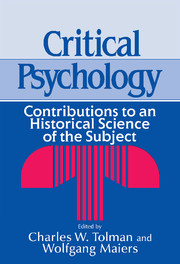Book contents
- Frontmatter
- Contents
- Preface
- Acknowledgments
- Contributors
- Critical Psychology
- 1 Critical Psychology: An Overview
- 2 Critical Psychology: Historical Background and Task
- 3 Societal and Individual Life Processes
- 4 Experience of Self and Scientific Objectivity
- 5 Psychoanalysis and Marxist Psychology
- 6 Emotion, Cognition, and Action Potence
- 7 Action Potence, Education, and Psychotherapy
- 8 Personality: Self-Actualization in Social Vacuums?
- 9 The Concept of Attitude
- 10 Client Interests and Possibilities in Psychotherapy
- 11 Play and Ontogenesis
- 12 Functions of the Private Sphere in Social Movements
- Bibliography
- Index
3 - Societal and Individual Life Processes
Published online by Cambridge University Press: 21 March 2010
- Frontmatter
- Contents
- Preface
- Acknowledgments
- Contributors
- Critical Psychology
- 1 Critical Psychology: An Overview
- 2 Critical Psychology: Historical Background and Task
- 3 Societal and Individual Life Processes
- 4 Experience of Self and Scientific Objectivity
- 5 Psychoanalysis and Marxist Psychology
- 6 Emotion, Cognition, and Action Potence
- 7 Action Potence, Education, and Psychotherapy
- 8 Personality: Self-Actualization in Social Vacuums?
- 9 The Concept of Attitude
- 10 Client Interests and Possibilities in Psychotherapy
- 11 Play and Ontogenesis
- 12 Functions of the Private Sphere in Social Movements
- Bibliography
- Index
Summary
In its persistent effort to expose the limited knowledge content of bourgeois theories and their resulting subservience to the capitalistic class perspective, militant materialism often finds itself on the receiving end of a similar treatment. The Marxist approach is said, for example, to be an essentially economic analysis that is therefore necessarily limited where the concern goes beyond the bare conditions of human life to the human being as such, that is, to psychophysical dispositions, biological endowments, vital needs, in short to human nature. Such conclusions come not only from those who hold views of psychology, scientific or otherwise, in which the conditions of individual human life are thought not even to require an economic analysis, but are understood merely as “stimuli,” as natural “environment,” or the like. Similar opinions are found even among those with materialistic pretensions, representing positions that actually claim to understand human “relations” from a Marxist perspective, but for the purpose of apprehending human “nature” fall back upon non-Marxist, especially subject-scientific approaches like psychoanalysis. Indeed, in their practice many Marxists plainly declare themselves incapable of dealing with “psychological” questions, which they simply abandon to “the psychologists.”
Can “militant materialists” afford to give up their militancy when it comes to “human nature” and its scientific understanding? The answer surely is “no,” and not only from the perspective of a Marxism committed to raising the whole of human knowledge and practice to an historically higher level through its liberation from the constraints of bourgeois ideology, a level at which, in principle, questions of “appropriateness” do not arise.
- Type
- Chapter
- Information
- Critical PsychologyContributions to an Historical Science of the Subject, pp. 50 - 64Publisher: Cambridge University PressPrint publication year: 1991
- 31
- Cited by



